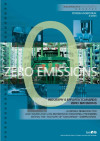Suchergebnisse
Material utilization of end-of-term textiles
Mechanical processing of the non-reusable part of collected end-of-life apparels (e.g. cutting, sifting, etc.); development of marketable application for the obtained short fibers in the field of construction materials (e.g. bitumen modification)
The Paper Factory in the Year 2030
Paper factory in the year 2030 as an integrated part of a sustainable economy and a supplier of sustainable paper products fulfilling criteria for sustainability at highest possible level.
ZERIA 3 (Zero Emissions Research in Application)
Elaboration of the principles for zero emission enterprises. The results show that this approach can be realistic and economically advantageous in many cases.
Improvement of resource efficient use of wood
Modelling of wood processing in order to demonstrate the developments' impacts on performance
RAINBOW 2
Application and expansion of knowledge gained in the project Rainbow1 for the production of new, functionalised fibres using renewable resources as well as other fibre manufacturing methods in a pilot plant scale production.
Product Service Systems Water
Based on former FdZ projects in the area of PSS, EMA and Zero Emission PSS Water develops and realises a guideline with which sustainable water management in industry and public utiliies as a service can be offered.
ZERMET - Zero Emission Retrofitting For Existing Textile Plants
Minimisation of the consumption of water, chemicals and energy in the textile industry. Further development of the ZERMEG approach in the form of a questionnaire and application in the textile industry.
Chemistry, process design and sustainable economic development
The results of this project were to deliver the basics for chemical process engineering taking into account the requirements of sustainable development. The proposed results will have to be in conformity with ecological, economic and social requirements for sustainability. Hence the processes will mostly be based on renewable resources.
New potentials using hardwood with small diameters in forestry and timber industry
Identification of potentials to use hardwood with small diameters (SDH) in Austria with the help of the value added chain from the forest's location to the processor. Analysis and evaluation of availability, quality and market potential.
Wood-processing employing a superimposition of ultrasonic vibrations
Development of wood-processing techniques employing high-frequency ultrasonic vibrations in terms of applications in the woodworking industry.
Semi-manual dismantling of small electric and electronic equipment
Improving the tecnology of manual dismantling processes of small electric and electronical appliances, used in social enterprises. Via software modules, developed do analise dismantling processes, from dismantling-factories to dismantling-parks.
Industry´s Efforts Towards Zero Emissions

Austrian Research for Low-Waste and Low-Emissions in Industrial Processes within the "Factory of Tomorrow" Subprogram
Forschungsforum
3/2004
Herausgeber: BMVIT
Englisch, 6 Seiten
Downloads zur Publikation
Development of a comprehensive procedure within the design of high-speed-cutting processes in consideration of environmental protection and occupational health aspects
In the metal working industry high-speed-cutting (HSC) in connection with minimal quantity cooling-lubrication promises a high potential for saving process materials. On the one hand costs of purchase and disposal of metal working fluids (MWF) decrease, on the other hand the reduction of dermal diseases and emissions of MWF-dusts are expected.
Establishment of a "Sustainability Label for repair-friendly constructed electr(on)ic household appliances (brown and white goods) as a shopping guideline for consumers"
The scope of the project comprises the development of criteria for a Sustainability Label for repair-friendly constructed appliances, marketing and PR activities with a focus on producers and consumers, training of auditors and labelling of at least one product.
Chemo-physical analysis and assessment of color alterations of selected hardwoods and development
Analyses of biochemical reactions causing colour changes during the hygrothermal treatment of selected hardwoods will lead to a model for defined and process-based colouration or maintenance of colour in drying and steaming processes. Based on this development the new drying and steaming schedules will be implemented in the industry.
Integrated Service Models for increased resource-efficiency in the business-to-business sector (INERIWI)
For the major resource intensive commercial sectors the real function of products will be ana-lysed and elaborated how to provide the function of the product without selling it. Based on the present material intensity of the branches the potential reduction of environmental burden by applying such models as well as economic and social implications will be deduced.
SUPROMED: Reprocessing and Reuse of Single Use Medical Devices in the Light of Sustainable Development Criteria - Implementation in Austria
In contrast to other countries there is currently no reprocessing and reuse of single use medical devices in Austria. Thus the potential for major ecological and economical savings remains unused. In a stakeholder dialogue, practical implementation strategies were developed to change the trend towards a sustainable value-added chain.
Creating a concept for the development of a "lubrication service" to maximize plant life on the basis of ionic liquids as special lubricants.
Creating a concept of a "lubrication service" to maximize plant life and reduce their resources consumption - a combination of development service, production and lubricating service.
Feasibility concept for a customer-focused and resource-efficient production of wood-products, considering a parquet factory as an example
An innovative approach aiming higher resource-efficiency and added value by using new quality standards and production systems in parquet industry. A customer friendly product will be possible by combining industrial production methods with the flexibilty of a manufacture.
Thermal detection of cracks on glowing wire during the process of rolling with regard to reduction of rejections
Developing a non-destructive and fully automated testing to detect surface cracks and laps in rolled wires during the production at temperature values of 800-1000°C and at a material speed of 30-40 m/s, with regard to reduction of rejections.
